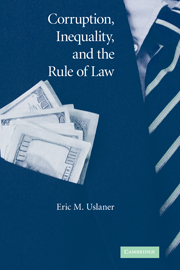Book contents
- Frontmatter
- Contents
- Preface
- 1 Corruption: The Basic Story
- 2 Corruption and the Inequality Trap
- 3 Corruption, Inequality, and Trust: The Linkages Across Nations
- 4 Transition and the Road to the Inequality Trap
- 5 The Rocky Road to Transition: The Case of Romania
- 6 Half Empty or Almost Full?: Mass and Elite Perceptions of Corruption in Estonia, Slovakia, and Romania
- 7 The Easy and Hard Cases: Africa and Singapore and Hong Kong
- 8 Corruption Isn't Inevitable, But …
- 9 Conclusions
- Appendix
- References
- Index
3 - Corruption, Inequality, and Trust: The Linkages Across Nations
Published online by Cambridge University Press: 27 July 2009
- Frontmatter
- Contents
- Preface
- 1 Corruption: The Basic Story
- 2 Corruption and the Inequality Trap
- 3 Corruption, Inequality, and Trust: The Linkages Across Nations
- 4 Transition and the Road to the Inequality Trap
- 5 The Rocky Road to Transition: The Case of Romania
- 6 Half Empty or Almost Full?: Mass and Elite Perceptions of Corruption in Estonia, Slovakia, and Romania
- 7 The Easy and Hard Cases: Africa and Singapore and Hong Kong
- 8 Corruption Isn't Inevitable, But …
- 9 Conclusions
- Appendix
- References
- Index
Summary
You warn us with appropriate caresses
That virtue, humble virtue always wins.
Now please before your moral verve oppresses
Our middle's empty there it all begins….
For even honest folk may act like sinners
unless they've had their customary dinners.
From “How to Survive,” Berthold Brecht and Kurt Weill, The Threepenny OperaIs there really an inequality trap? And does corruption rest more upon social strains – high inequality and low trust – than upon strong institutions? I present evidence in this chapter for the framework that I have outlined in Chapter 2. I also show that there may be direct linkages between inequality and corruption – first by introducing a new measure of inequality that also reflects in-group trust and second by examining cross-national surveys on people's perceptions of corruption. Where some groups fare much better than others in a society, corruption will be much higher. This measure of uneven economic development encompasses both economic inequality and the social strains that lead to high in-group trust and low out-group faith in others. This new measure is strongly related to corruption, but also to almost all of the other determinants of corruption, leading to problems in estimating either direct or indirect effects in a statistical model, but suggesting very strong support for an inequality trap.
- Type
- Chapter
- Information
- Corruption, Inequality, and the Rule of LawThe Bulging Pocket Makes the Easy Life, pp. 58 - 93Publisher: Cambridge University PressPrint publication year: 2008



